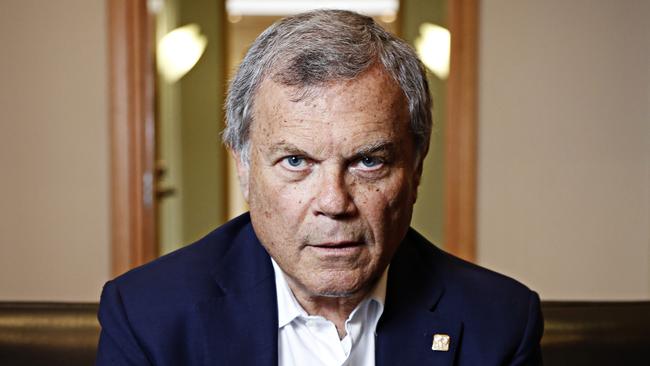Sorrell: Marketers need to reclaim control
Advertising veteran Sir Martin Sorrell believes outsourcing advertising was “a mistake” and warns CMOs need to take control as social media platforms continue to grow with AI.

Chief marketing officers need to wrest back control of marketing, in particular first-party data, from external agencies, according to S4 Capital executive chairman Sir Martin Sorrell.
The industry veteran, who built WPP into a global empire of advertising agencies, said the decision to outsource marketing control to external agencies was “a mistake” with marketers now needing to bolster their internal control.
In an exclusive interview with The Growth Agenda on a rare trip to Australia, Mr Sorrell said the future for marketers involves hybrid in-house advertising models, which embed agency staff within the marketing departments under the CMOs direct control.
“The three things CMOs should worry about are agility, taking back control and doing more internally,” said Mr Sorrell.
“After the great financial crisis, all the CFOs said, ‘get the headcount out of our organisation. We’ve got to do less ourselves and more outsourcing’.
“I think we made a mistake,” he said. “The in-housing model is a more effective model because [companies] need first party data and CMOs need to have more control of what they do.”
It’s a model that S4 Capital’s digital pure play agency Monks, which was known as media.monks until last month, is currently running with automotive giant GM. The approach, which operates as an embedded agency partnership, aims to enable greater collaboration and streamline strategic decision making.
Mr Sorrell praised Telstra’s +61 agency model with Bear Meets Eagle on Fire, TBWA and OMD as a “great” example of the hybrid approach.
The hybrid model offers opportunities for talent and technology, however, Mr Sorrell maintains that marketer control over the data is critical, particularly, as the dominance of the social media platforms continues to grow.
“Look, in-housing is not right for everyone, but CMOs have to do more. They can’t outsource the way that they did traditionally, because you’ve got to have control of the first party data, it’s critical.”
“I think the platforms are going to get closer to the clients. That is not a threat. In the old days, they couldn’t do it because it was a labour-intensive process, nowadays they can because it’s much more capital-intensive. Historically, the platforms couldn’t mimic the agencies but now with AI, they can do much more.
“We have to get closer to them and build stronger relationships. I used to call them frenemies and it’s morphing now to a much closer relationship. A lot of people get pissed off when I say that, but I think that’s the way it’s going to go.”
Mr Sorrell argues the rise of AI will continue to play into the dominance of the platforms and the tech giants due to their size, spending power and influence.
“AI will only increase the platform dominance. If you look at the numbers (the global advertising market) will hit $1 trillion this year. Of that, $700bn, roughly, will be digital, so Google will be $250bn, Meta will be $150bn, and Amazon will be $60bn, that’s $460bn, roughly, of that 700bn that will be invested in those three platforms.
“With AI you need enormous resources to develop programs, not just the investment in data and distribution but also in energy and power supply. The big players – Nvidia, Apple, Microsoft – they are already countries, if you consider market cap is equivalent to GDP. Apple, Microsoft, and Nvidia are $3trn, that's about as big as the UK.
However, Mr Sorrell warned that regulation will be crucial in the coming years.
“Self regulation is going to be really important and it’s incumbent on alphabet, meta and Amazon to exercise restraint. They’ve been criticised before for not doing it. The regulator is not going to be able to keep up.”
Mr Sorrell is characterisically dismissive of the AI doomsayers arguing the opportunities stretch far beyond efficiencies – although he does admit that the automation of media planning and buying will have a significant impact on the number of people working at media agencies.
He points to opportunities around AI content production including visualisation and copywriting and hyper personalisation around advertising campaigns. He also cites monks’ joint venture with Nvidia, AWS and Adobe to use AI for remote broadcasting at a significant cost reduction. Mr Sorrell said the democratisation of knowledge will create “much flatter, less bureaucratic, open-source companies”.
“Information is power. If you distribute information to AI organisations, you get totally different organisation structure. Much flatter, less bureaucratic, open and open source companies. The more information you spread, the more people share. What kills clients, kills agencies, is the people who don’t share.”
However, he’s less optimistic when it comes to brand marketing.
“People don’t like to hear it but I think our business has become short term.
“CEOs have to talk to you every quarter about their revenues and their profitability, so the upper funnel brand stuff is less appealing than the lower funnel, mid funnel activation performance stuff. And the true thing is, it’s a balance, as you say.
“But I think our business has become short term because everything is more volatile. Consumers are much more fickle. Gen Z, Gen Y, are more fickle than we were. There’s just so much more volatility,” he said.


